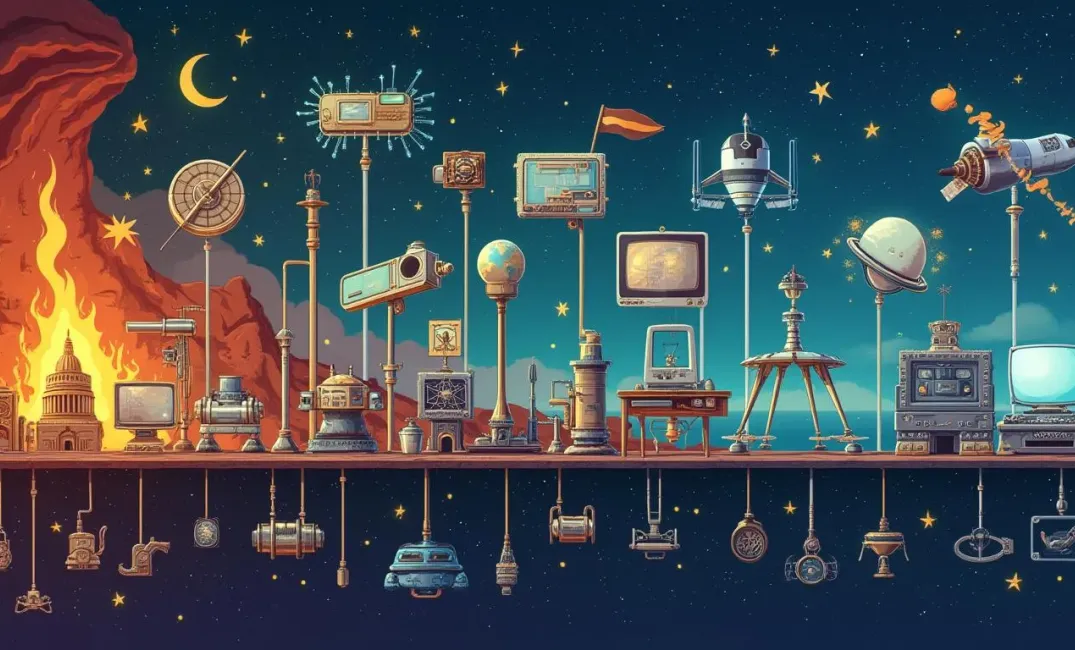Introduction: Humanity's Unyielding Creative Spirit
"Innovation distinguishes between a leader and a follower." — Steve Jobs
Throughout history, human innovation has been the cornerstone of cultural, technological, and societal transformation. It is the creative force that propels civilizations forward, igniting advancements and reshaping realities across epochs. From the discovery of fire to modern digital frontiers, innovation emerges as a testament to humanity's unyielding spirit and determination to triumph over challenges, adapt to change, and harness potential.
In this exploration, we delve into the legacy of human innovation, examining key milestones, the driving mechanisms behind creativity, and the future of innovation in shaping emerging civilizations.
The Seeds of Innovation: Discovering Potential in Ancient Times
Paleolithic Ingenuity
- Harnessing Fire: The control of fire marked a pivotal moment in human history, transforming living conditions, enhancing nutrition, and fostering social interactions. This fundamental innovation laid the groundwork for subsequent technological developments.
- Toolmaking Advancements: Early humans displayed creativity in tool design, crafting implements from stone, bone, and wood. These artifacts demonstrate the evolution of problem-solving and adaptation to diverse environments.
Agricultural Revolution
- Domestication of Plants and Animals: The advent of agriculture reshaped societies from nomadic lifestyles to settled communities, spurring population growth and enabling complex social structures.
- Irrigation and Land Management: Innovative land management techniques, like the Mesopotamian and Egyptian irrigation systems, reflected strategic thinking and cooperative community efforts essential for sustaining agriculture in various regions.
Innovation Through Time: Cultures and Epochs
The Classical Era and Philosophical Inquiry
- Mathematical and Philosophical Pioneers: The Greek and Roman worlds flourished with intellectual and innovative pursuits. Thinkers like Archimedes, Euclid, and Pythagoras introduced groundbreaking mathematical concepts that paved the way for modern sciences.
- Architectural Marvels: Classical civilizations constructed iconic structures, such as the Parthenon and the Colosseum, showcasing architectural ingenuity and artistic vision that continue to inspire modern design principles.
The Islamic Golden Age
- Scientific and Cultural Renaissance: The Islamic Golden Age was a period of prolific intellectual and cultural achievements, facilitated by the establishment of centers such as the House of Wisdom in Baghdad. Innovations spanned across mathematics, medicine, astronomy, and more.
- Preservation and Expansion of Knowledge: Scholars translated and expanded upon the works of earlier civilizations, bridging knowledge and fostering cross-cultural exchanges that enriched global intellectual and technological landscapes.
The Industrial Revolution: A Transformative Epoch
Mechanization and Expansion
- The Steam Engine: The development of the steam engine by innovators like James Watt catalyzed the Industrial Revolution, revolutionizing transportation and industry while enhancing production efficiency and economic growth.
- Textile Innovations: The mechanization of textile production, exemplified by innovations such as the spinning jenny and power loom, fueled industrial output and propelled economic prosperity over centuries.
Societal Impacts and Challenges
- Urbanization and Labor Transformations: The Industrial Revolution prompted a mass migration to urban centers, altering social fabric and labor structures, while presenting new challenges related to working conditions, child labor, and environmental pollution.
- Technological Disparities: While industrialization spurred prosperity, it also accentuated disparities, provoking movements for labor rights and inspiring visions of equitable technological advancement.
The 20th Century Explosion: From Analog to Digital
The Digital Revolution
- Computational Breakthroughs: The creation of the computer and development of programming languages revolutionized information processing and communications, giving rise to the digital age and transforming daily life across the globe.
- Internet and Connectivity: Tim Berners-Lee's World Wide Web democratized access to information, connecting individuals worldwide, fostering globalization, and establishing digital footprints reshaping entire industries and societies.
Scientific Frontiers
- Medical and Biological Innovations: Innovations in medical science, including antibiotics, vaccines, and genetic research, extended human lifespan and enhanced quality of life. This era witnessed tremendous strides in understanding and manipulating biological foundations.
- Space Exploration: Space exploration milestones like landing on the Moon and deploying the Hubble Space Telescope have expanded humanity's cosmic perspective, spurring technological advancements and revealing the universe's enigmatic nature.
The Future Projections: Innovation in the 21st Century and Beyond
Emerging Technologies and Challenges
- Artificial Intelligence and Robotics: AI and robotics are poised to redefine industries and societal norms, offering unprecedented efficiencies and ethical complexities. Balancing automation with human-centric development is vital.
- Renewable Energy Solutions: Innovations in renewable energy, particularly solar, wind, and nuclear fusion, aim to address climate challenges, ushering in sustainable practices that harmonize technological progress with planetary stewardship.
Human-Centric Innovation
- Ethical Considerations and Social Impact: As innovation accelerates, ethical considerations take center stage, urging reflection on its impact on privacy, security, and societal well-being while ensuring equitable distribution of advancements.
- Collaborative Ecosystems: Global collaboration fosters innovative ecosystems, harnessing diverse perspectives to navigate challenges, solve complex problems, and drive equitable social and economic progress in burgeoning and established societies alike.
Conclusion: The Unending Journey of Human Innovation
"The true sign of intelligence is not knowledge but imagination." — Albert Einstein
Human innovation continues to be an infinite journey of exploration, celebration, and reflection. Its legacy is not only a testament to humanity's boundless creativity and tenacity in pushing phases across time but also a beacon illuminating paths toward sustainable and equitable futures.
As we stand on the shoulders of past innovators, committing to ethical principles, inclusivity, and shared aspirations lends unprecedented power to shape a world that honors and evolves humanity's rich tapestry. Embracing inevitable uncertainties, let us persistently seek, imagine, and innovate—carving paths where inspired dreams and daring ideas converge to transform aspirations into reality on the canvas of the future.
INNOVATION, TECHNOLOGICAL ADVANCEMENT, HUMAN HISTORY, FUTURE OF TECHNOLOGY, ETHICAL INNOVATION, CULTURAL TRANSFORMATION, HUMAN-CENTRIC INNOVATION

